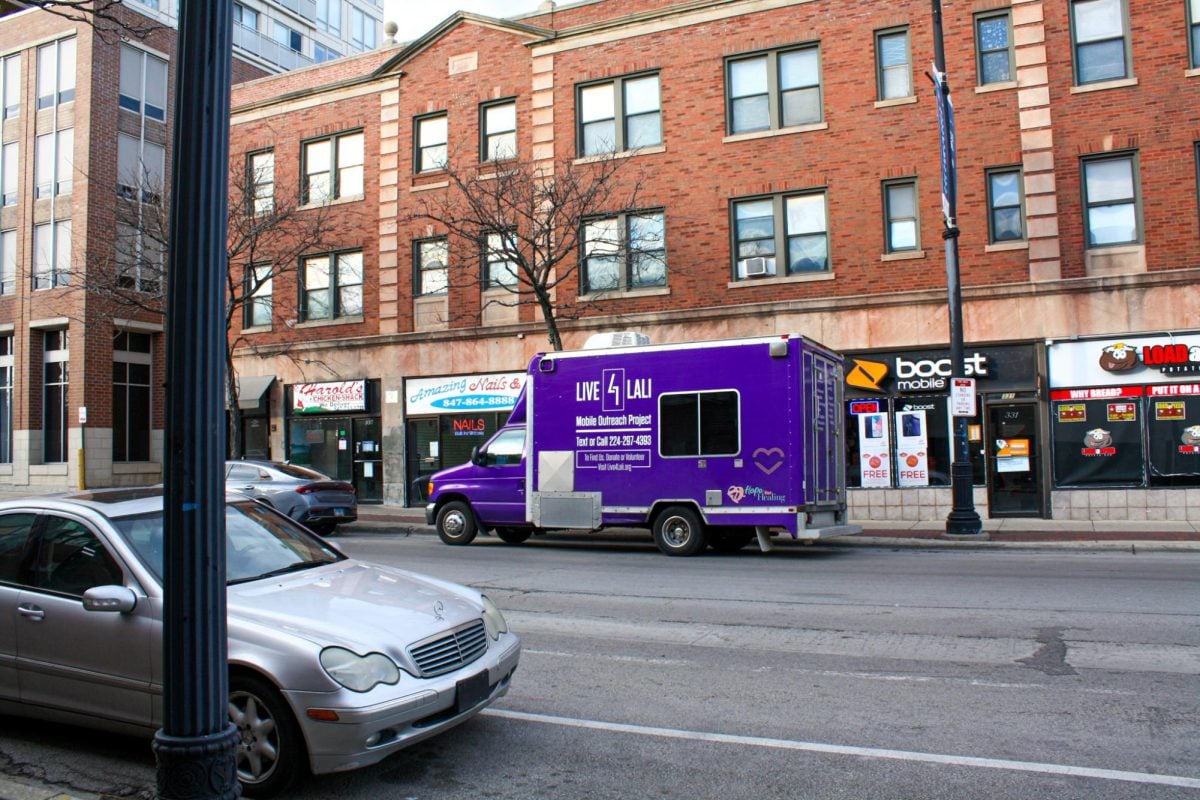Six months ago, Live4Lali’s purple truck — parked around the corner from the Howard Street Red Line station — may only have garnered suspicion or curiosity from passersby.
Since mid-July, however, the vehicle has become a familiar sight to Evanston residents.
“People recognize us now. It’s really refreshing,” said Alex Mathiesen, Live4Lali’s director of programs. “It’s empowering because they’ll see the truck rolling down the road, and people will come riding up and be like, ‘Man, I’m so glad I didn’t miss you today.’ Every time we go out there, we see 60 people-ish, and it’s continuing to grow.”
Live4Lali aims to mitigate not only the immediate harm caused by substance use but also the subsequent legal, social and health issues, according to its website.
The truck, known as “The Stigma Crusher,” is Live4Lali’s mobile outreach project, and it provides harm reduction resources, like safe injection kits and naloxone, to people with substance use disorders across different Chicago-area suburbs.
The truck also administers food, personal care items and masks as well as assistance with finding treatment and recovery options.
“Every single person that we serve takes food from us, every single one,” Mathiesen said. “We’re not just out there handing out needles and pipes. We’re there to be a hub for a community initiative, to get people into wherever they need to go.”
The truck is located on West Howard Street near Chicago Avenue from 1:30 to 3:30 p.m. on Tuesdays.
Mathiesen, who himself is a former heroin user, said lived experience is essential to Live4Lali’s organizational identity and guides its programming.
“We believe very firmly in the ‘nothing for us without us’ mentality,” Mathiesen said.
Live4Lali also partners with other organizations in the Evanston area, including local nonprofit Connections for the Homeless. Both groups share a philosophy of supporting each individual’s specific needs regardless of where they are in their recovery process.
Alaina Slempkes, a community nurse at Connections for the Homeless, said Live4Lali provides training for drug overdose prevention to Connections’ staff, among other services.
“Some of our participants may use substances or be actively drinking or engaging in substance use, but that doesn’t mean that we don’t believe that we can provide support to them,” Slempkes said. “We still believe they should be able to receive housing and support. We try to approach all of our participants without judgment.”
Maryann Mason, an associate professor at the Feinberg School of Medicine, said she is a “strong proponent” of harm reduction because of its efficacy in preventing overdoses.
People with little knowledge of the research and data behind harm reduction often falsely believe the approach promotes drug use, according to Mason.
“I don’t think it’s the only practice we should have, because overdoses can have consequences that last, even if you survive, but it’s the place where we need to begin,” Mason said. “It helps people who are already using at that level be safer and in some cases actually reduce their use.”
Mathiesen described substance use as a devastating illness rooted in shame and isolation. He said Live4Lali supports harm reduction because it can decrease some of these negative impacts.
“Harm reduction enables people to believe that they are worthy of something again,” Mathiesen said. “If I can give back to people that are like me, to let them believe in themselves again, I believe positive change can happen.”
Email: [email protected]
Related Stories:
— Mayfest, HPaW run out of fentanyl test strips, search for other options ahead of Dillo Day
— Inside Northwestern scientists’ bid to make an overdose prevention implant
— ‘We see real miracles here’: local groups tackle opioid addiction






